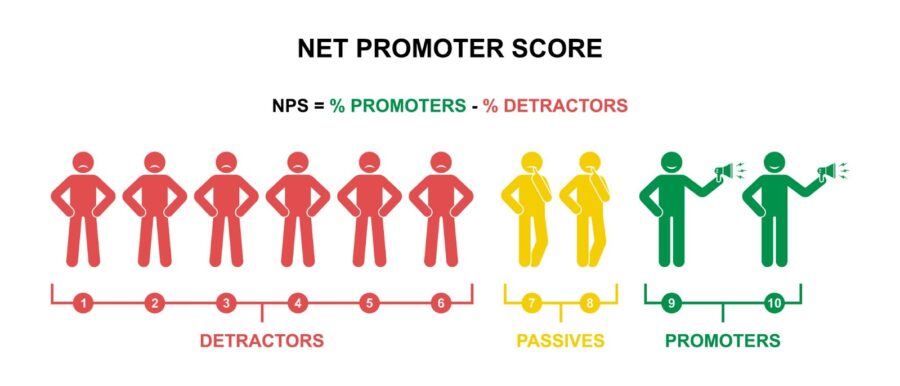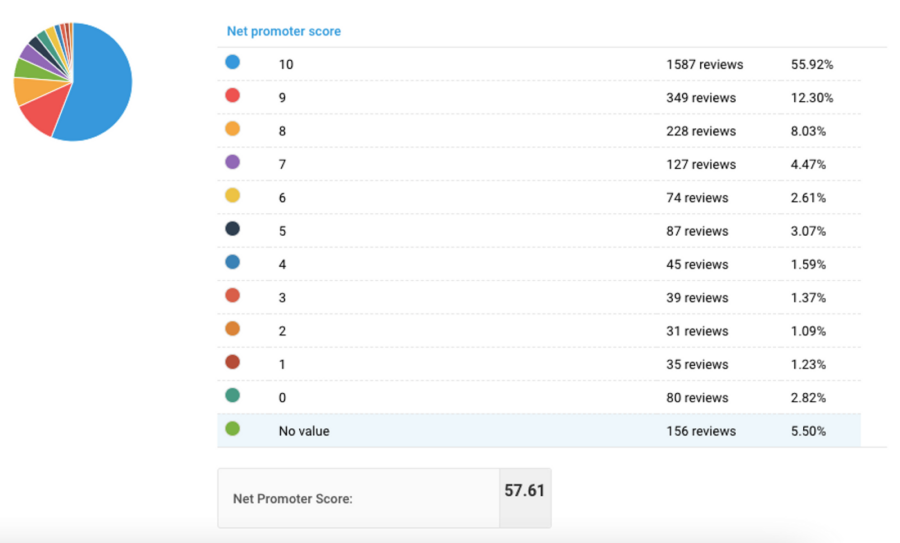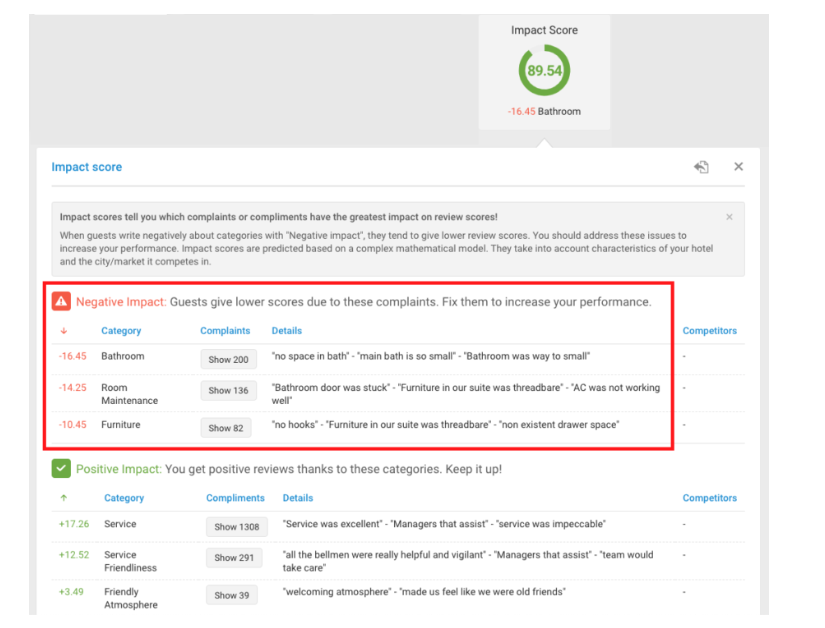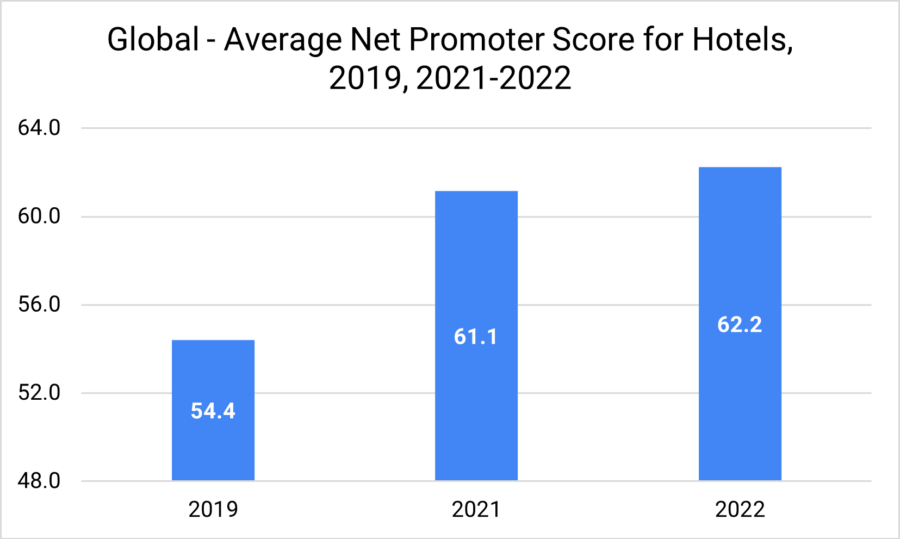In the last years, staying ahead of the competition while providing an exceptional guest experience has become increasingly difficult. Here’s how the Net Promoter Score (NPS) can help your hotel create a virtuous cycle of guest satisfaction, positive recommendations, and increased retention, ultimately driving growth and success in the highly competitive hospitality industry.
What is Net Promoter Score?
Net Promoter Score (NPS) measures customer loyalty and gauges the likelihood of customers recommending a company, product, or service to others.
The NPS methodology revolves around a single question: “On a scale of 0 to 10, how likely are you to recommend our hotel to a friend or colleague?” Based on their responses, guests can fall into three categories: Promoters, Passives, and Detractors.

Promoters (Score 9-10): Your delighted guests will likely recommend your hotel to others. They act as brand advocates and can contribute significantly to the growth and success of the hotel.
Passives (Score 7-8): These guests are generally satisfied with their experience but are not actively promoting your hotel. While they may not spread negative word-of-mouth, they are also less likely to give a recommendation.
Detractors (Score 0-6): Detractors are dissatisfied guests more prone to sharing negative feedback about the hotel. Their negative experiences can harm the hotel’s reputation and hinder its growth. Identifying and addressing their concerns is essential to mitigate any negative impact.
Why is Net Promoter Score Important for Hotels?
The concept behind NPS lies in the belief that customer loyalty is a powerful driver of business growth. Hotels can enhance customer satisfaction and loyalty by creating a base of Promoters and minimizing the number of Detractors, ultimately driving positive word-of-mouth recommendations.
NPS is not only about the score itself but also about the actionable insights derived from guest reviews. It serves as a valuable tool for understanding guests’ needs, identifying areas of improvement, and making data-driven decisions to enhance the overall guest experience.
Implementing NPS in hotels provides a standardized way to measure customer loyalty and a benchmark for tracking performance over time. It enables hotels to proactively address issues, strengthen customer relationships, and make strategic improvements that positively impact guest satisfaction, retention, and revenue generation.
How to Implement the Net Promoter Score for Your Hotel
Implementing NPS in hotels requires an effective strategy for collecting data that accurately represents customer sentiment and experiences. With the help of TrustYou, you can collect NPS data via a post-stay survey.
Collect the NPS data Using TrustYou
Post-Stay Surveys: Sending an NPS question integrated into a survey shortly after guests’ check-out allows them to reflect on their entire stay experience. This touchpoint captures their overall impression and satisfaction with the hotel’s services, facilities, and interactions with staff.

By carefully selecting the survey methodology and touchpoints, hotels can obtain valuable NPS data that accurately reflects the guest experience and provides actionable insights for improving customer satisfaction and loyalty.
Get Your Demo with TrustYou
See an overview of the world’s leading all-in-one platform, including reputation management, review marketing, and guest surveys. You’ll see firsthand how to make better business decisions for your organization, earn trust, and succeed.

Analyze and Interpret the NPS
Once NPS data is collected, the next step is identifying and categorizing guests into promoters, passives, and detractors. This classification will help you understand the distribution of customer sentiments and their potential impact on business growth.
By identifying these customer segments, you can focus your efforts on nurturing promoters, understanding the concerns of passives, and proactively resolving issues for detractors to turn them into satisfied customers.
Here are a few things to consider when analyzing the NPS results:
- Regularly monitor NPS evolution together with other indicators.
The evolution of your NPS will help identify key trends and quickly react to guests’ sentiment changes. Look for changes in scores, recurring feedback themes, and shifts in customer segments.

- Ensure consistency in data collection and analysis
Establish a consistent survey methodology and use the same questions and rating scale to gather NPS data across different touchpoints and channels. This ensures consistency in data collection and facilitates meaningful comparisons over time.
Aim to collect NPS data from a representative sample of guests to ensure the data accurately reflects the overall guest sentiment. Avoid over-surveying specific guest segments and maintain a balanced representation of customer profiles.
Implement quality control measures to ensure data integrity. This includes monitoring for duplicate or fraudulent responses, validating the accuracy of data entry, and addressing any potential biases in the collection process.
- Include NPS in performance evaluation and employee incentives.
You can include NPS and other guest satisfaction metrics in performance evaluation and employee incentives to enhance a customer-centric culture. This will emphasize the importance of delivering exceptional guest experiences and will encourage employees to actively contribute to improving NPS scores.
Make sure to provide regular feedback and coaching based on NPS data and other guest experience metrics. This will help your staff understand their strengths and areas for improvement, enabling them to deliver better customer service.
Introduce incentives that tie rewards and recognition to achieving NPS targets. This motivates employees to prioritize customer satisfaction and provides a tangible incentive for delivering exceptional experiences.

The Taj Mahal Palace Mumbai: Becoming the Best Hotel in the World
Consistency and continuous learning and development are key to being able to recognize and inspire every guest throughout the full hotel experience, as well as a hotel team with an extraordinary focus.
Improve Your Hotel’s NPS
To improve your NPS, think of immediate actions that will help you quickly address issues and long-term measures to improve overall performance.
Immediate Actions
- Solve issues on the go
Addressing issues your guests flagged during their stay will help prevent negative feedback and turn detractors into promoters. Act on the spot – the guests will appreciate your involvement and commitment to delivering a great experience.
- Respond to guest reviews
Whether you’re dealing with a Promoter, Detractor, or Passive, reply to all of your guests’ reviews. By responding to their feedback, you show that you value their opinion and increase their chances of returning to your property.
All You Need to Know About Responding to Guest Reviews
Your complete guide to responding to positive, neutral, and negative guest reviews with examples, a template response structure, and helpful data.

Long-term Actions
- Reach out to your guests.
Create customized email campaigns for your promoters, passives, and detractors. For example, you can thank your promoters and invite them to subscribe to your newsletter to get the latest offers and discounts. Target your passives by apologizing for their negative experience and opening a line of communication with the hotel’s manager.
- Identify areas of improvement.
Get a good grip on your strengths and weaknesses by looking at all the feedback you receive. TrustYou Analytics breaks down the data available from many reviews into actionable insights. We have over 180 categories you can track: from cleanliness to sustainability; these will give you a clear idea of what you can improve.

- Set realistic and achievable goals.
Understanding the NPS benchmarks within the hotel industry will help you establish a baseline for comparison. Knowing some averages will provide more context and help set realistic goals aligning with industry standards.
Looking at other external resources, a good NPS is somewhere between +15 and +30. Everything above +30 is a sign of a strong focus on excellence. Achieving a number closer to 100 is almost impossible – all hotels and brands have their share of detractors. NPS can also be negative – a sign that most guests are unhappy with your services. Once getting to a positive NPS, start progressively working towards improving it.
We also explored how the average NPS evolved for the hotels using our platform in 2019, 2021, and 2022. It pleasantly surprised us that the numbers are way higher than the averages we found from external resources.

As with other indicators, these averages shouldn’t be approached as a one-size-fits-all solution. Numbers can differ from region to region, number of stars, or whether you’re an independent or enterprise-level hotel. That’s why, when setting NPS goals, it’s essential to look at your current capabilities, performance, and resources. Balancing challenging targets and achievable improvements based on the hotel’s specific circumstances is crucial.
- Train and empower the hotel staff.
Investing in comprehensive training programs equips staff with the necessary skills and knowledge to deliver exceptional customer service. Training should emphasize the importance of empathy, active listening, and problem-solving to address guest concerns effectively. Empowering staff to make decisions and resolve issues independently fosters a sense of ownership and accountability, leading to improved guest experiences.
- Personalize guest interactions.
Personalization plays a crucial role in enhancing customer satisfaction. Encourage staff to go the extra mile by using guest names, anticipating preferences, and providing tailored recommendations. Personalized touches can include welcome notes, recognizing special occasions, or remembering guest preferences for room amenities. This level of attention and care demonstrates a commitment to delivering a memorable and personalized experience.
NPS is a great way to assess your guests’ satisfaction. As with many other metrics taken independently, you’ll probably figure out just a few puzzle pieces to improve your guest experience. Analyze NPS together with other guest satisfaction metrics to get a complete picture and solve the root cause of your issues. In this way, you will improve your NPS and be one step ahead towards building a loyal customer base and ensuring healthy growth for your business.
*the average NPS scores were requested at the beginning of June 2023. Any other set of data may vary if requested at an earlier or later stage.


